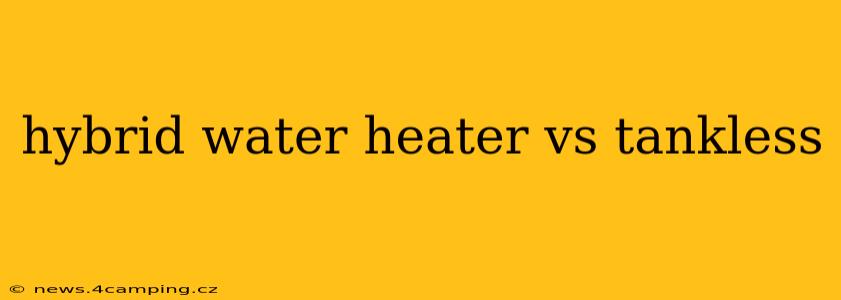Choosing the right water heater can feel like navigating a minefield. Two popular options vying for your attention are hybrid (heat pump) water heaters and tankless water heaters. Both offer energy efficiency improvements over traditional tank water heaters, but they cater to different needs and lifestyles. This comprehensive guide will help you understand the key differences, advantages, and disadvantages of each to make an informed decision.
What is a Hybrid (Heat Pump) Water Heater?
A hybrid water heater, also known as a heat pump water heater, uses electricity but in a far more efficient way than a standard electric water heater. Instead of directly heating the water with electric resistance elements, it extracts heat from the surrounding air and transfers it to the water tank. This process uses significantly less energy, resulting in lower operating costs. Think of it as a refrigerator working in reverse.
Advantages of Hybrid Water Heaters:
- High Energy Efficiency: Hybrid water heaters boast significantly higher Energy Factor (EF) ratings than standard electric water heaters, translating to substantial energy savings over their lifespan.
- Lower Operating Costs: The increased efficiency directly translates to lower electricity bills.
- Environmentally Friendly: Reduced energy consumption contributes to a smaller carbon footprint.
- Relatively Quiet Operation: Compared to tankless water heaters, they operate more quietly.
Disadvantages of Hybrid Water Heaters:
- Higher Initial Cost: Hybrid water heaters typically have a higher upfront purchase price than traditional electric water heaters.
- Space Requirements: They are larger than standard electric water heaters and require adequate ventilation.
- Ambient Temperature Dependence: Their efficiency is affected by the surrounding air temperature; they perform best in warmer climates. Performance can degrade in very cold environments.
- Potential for Freezing in Extremely Cold Climates: In extremely cold climates, proper insulation and protection from freezing temperatures are crucial.
What is a Tankless Water Heater?
A tankless water heater, also known as an on-demand water heater, heats water only when you need it. It doesn't store hot water in a tank, eliminating standby heat loss, a significant source of energy waste in traditional tank water heaters. Tankless heaters can be either gas or electric powered.
Advantages of Tankless Water Heaters:
- Endless Hot Water: They provide a seemingly endless supply of hot water, perfect for larger households or situations with multiple simultaneous hot water demands.
- Space Saving: They are compact and can be mounted on a wall, freeing up valuable floor space.
- Long Lifespan: Tankless water heaters generally have a longer lifespan than traditional tank water heaters.
- Energy Efficient (Depending on Usage): While they are efficient, their energy efficiency is heavily dependent on usage. Infrequent use might result in lower energy savings compared to a hybrid system.
Disadvantages of Tankless Water Heaters:
- High Initial Cost: Tankless water heaters, particularly gas models, have a higher upfront cost than conventional tank water heaters.
- Higher Installation Costs: Professional installation is often required, adding to the overall cost.
- Can Be Noisy: Some tankless water heaters can be quite noisy during operation.
- Limited Hot Water Output: Some models might struggle to provide sufficient hot water for multiple simultaneous uses (depending on the unit's size and flow rate).
- Potential for Scalding: The near-instantaneous heating can lead to scalding if not properly controlled via temperature settings.
Hybrid Water Heater vs. Tankless: Which is More Energy Efficient?
This is a complex question with no single answer. Both are more efficient than traditional tank water heaters, but their relative efficiency depends on several factors, including:
- Climate: Hybrid water heaters excel in milder climates, while tankless heaters might be more efficient in colder climates (depending on fuel source and usage).
- Usage Patterns: For households with consistent hot water demand, a tankless water heater might be more efficient. For homes with sporadic use, a hybrid system might be more energy-saving.
- Water Heater Size: Both systems need to be sized correctly for your household's hot water demands.
How Long Do Hybrid and Tankless Water Heaters Last?
- Hybrid Water Heaters: Typically last 10-15 years, sometimes longer with proper maintenance.
- Tankless Water Heaters: Generally have a longer lifespan, lasting 20 years or more with regular maintenance.
Which Type of Water Heater is Best for My Home?
The best choice depends on your specific needs and circumstances. Consider the following:
- Budget: Hybrid and tankless water heaters have higher upfront costs than traditional models.
- Household Size: Tankless heaters are ideal for large households with high hot water demand.
- Climate: Hybrid water heaters thrive in warmer climates.
- Energy Costs: Compare the long-term energy savings of each option based on your energy rates and usage patterns.
- Installation Requirements: Factor in the installation costs and space requirements for each type.
Ultimately, consulting with a qualified plumber or HVAC technician is recommended to determine the best water heater for your individual needs and home. They can assess your hot water usage, energy costs, and home's specific conditions to provide personalized recommendations.
